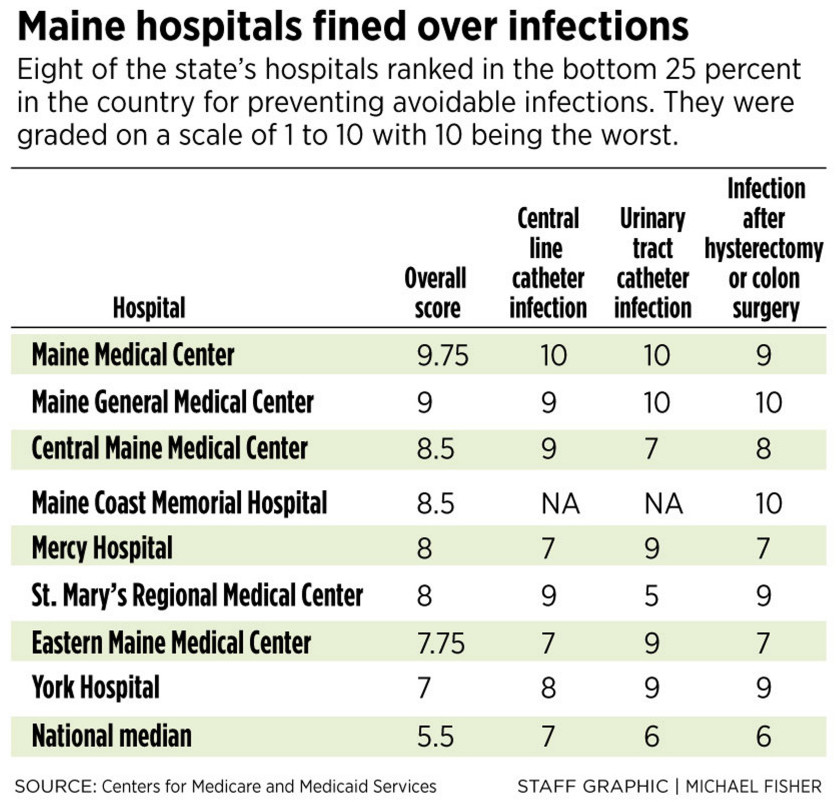When hospitals make you worse, not better
Hospitals should be safe havens. They should be places you and your family can rely upon to treat your illnesses and injuries, and to make you feel better.
But for too many people in Maine and around the country, the health risks are just beginning when patients enter the hospital doors.
On any given day, about one in 25 hospital patients has at least one hospital-acquired infection, according to the U.S. Centers for Disease Control and Prevention. Also known as healthcare-associated infections (HAIs), they are caused by viruses, bacteria, and other pathogens that exist within the hospital. They’re easily transmitted in the air, by people, and on equipment.
In this blog post, we explore some of the ways you and your family can prevent hospital-acquired infections. We also give you some advice on how to protect your rights, speak with a lawyer and take legal action if one happens to you.
Maine hospitals fall below average for preventing infections
But we live in Maine. We have great hospitals, doctors, and nurses. My chances of getting a hospital infection in Maine must be pretty low. Right?
Wrong. Compared to hospitals nationwide, Maine’s hospitals recently ranked in the bottom 25 percent for preventing avoidable infections. Eight hospitals were fined by the federal government for their poor scores, the Portland Press Herald reported.
The government calculated a composite score to rate the hospitals on a scale of 1 to 10, with 10 being the worst. Maine Medical Center scored a 9.75, the worst in Maine. The other penalized hospitals were Mercy Hospital in Portland, Central Maine Medical Center and St. Mary’s Regional Medical Center in Lewiston, MaineGeneral Medical Center in Augusta, Eastern Maine Medical Center in Bangor, York Hospital and Maine Coast Memorial in Ellsworth.
Check out this infographic from the Portland Press Herald:

Experts estimate that roughly 100,000 patients die each year from hospital-acquired infections. The most common types are urinary tract infection, surgical site infection, bloodstream infection (sepsis), and pneumonia.
Even routine procedures, such as a hernia repair or knee scope, can quickly turn into a life-threatening situation if the site becomes infected. Staphylococcus or staph, Methicillin-resistant Staphylococcus aureus or MRSA, and Clostridium difficile or C. diff, are infections that spread easily and are difficult to treat.
5 tools for preventing a hospital-acquired infection
While some cases of infections acquired in a hospital are unavoidable, there are some common sense tools that you can use to protect yourself or your loved one.
- Ask questions and stay involved in your treatment. As a patient, you have the legal right to participate in your treatment plan. You are entitled to ask questions about your care and get answers in terms you can understand. For any procedure, make sure you ask about the risks, including infection. If you feel you aren’t being heard, ask for help. Most hospitals have patient advocates or ombudsmen. It’s their job to listen to your concerns and make sure you have answers.
- Become chief of the hand-washing police. The single greatest step people can take to reduce the spread of infection is to wash their hands. It’s OK to politely remind nurses and other staff members to wash hands or put on a fresh pair of gloves before they make physical contact with you. The same rule applies to all visitors. Also, don’t see visitors who are sick.
- Follow the white blood counts. Routinely ask about your white blood count. The level should remain steady during your stay in the hospital. If your count is rising, that could be an indication of infection, and you should talk about it with your doctor.
- If you have a catheter or IV line, talk to your providers about it. Every day. Patients who have a tube inserted, such as central intravenous lines or a catheter to collect urine, face a higher infection risk. That risk increases over time. Ask your doctor or nurse when it will be removed, and whether you still need it.
- Don’t wait to press the “help” button. If you develop a red or inflamed area anywhere on your body, make sure to tell your providers about it right away. Same thing goes for any disruption to your wound dressings, catheters, or other tubes. It’s not your job to worry about how busy your doctors and nurses are. Your health is important and potential infection sites need to be looked at immediately.
You got an infection at a Maine hospital. Now what?
You went to the hospital to get better, only to acquire an infection. Now your health has gotten worse, possibly a lot worse. Besides dealing with your health problems (which might feel like a fulltime job), you may be wondering about your legal rights.
Can you file a lawsuit against the hospital for the infection you got there? How are you going to pay your additional medical bills, lost time at work, and other expenses?
In some cases of hospital-acquired infection, the answer is yes — you may be entitled to compensation. The first step is to contact a personal injury lawyer. At Berman & Simmons, our legal team has successfully handled more medical malpractice claims than any other law firm in Maine, including cases involving hospital-acquired infection. Our firm will speak with you free of charge about what happened and whether you might have a valid claim.
It’s important to contact a lawyer as soon as possible after you acquired the infection, because many steps must be taken to protect your rights.
Here are some common system failures that lead patients to pursue a medical malpractice claim against a hospital:
- Failure to take adequate precautions to protect you from infection.
- Failure to sterilize surgical instruments and equipment.
- Failure to properly diagnose and treat your infection in a timely manner.
If Berman & Simmons accepts you as a client, our attorneys and staff will gather your medical records and conduct a thorough investigation on your behalf. They will focus on the details so you can focus on your health and recovery. The staff can also give you guidance on how to defer or manage your unpaid medical bills while your case is pending.
Making a successful claim against a hospital for a hospital-acquired infection is much like solving a difficult puzzle. You will need a lawyer who understands where to find the right pieces, and how they fit together.
Ultimately, hospitals need to be held accountable for the harm that infections cause patients. One of the best ways to hold them accountable is through our civil justice system. By standing up for your rights, and demanding full and fair compensation, you can help send a message to hospitals that they must do more to protect patient safety.
Arm yourself with knowledge
Click on the links below to explore these additional resources.
- “Get Better Maine”, a hospital and provider rating site developed by the Maine Health Management Coalition.
- US News, “Your Rights as a Hospital Patient”
- U.S. Centers for Disease Control and Prevention, HAI data and statistics
- The Empowered Patient Coalition, founded by a family that lost their daughter to cancer, and whose fight against cancer involved avoidable hospital infection, misdiagnosis, and miscommunication between healthcare providers.
- ConsumersUnion Safe Patient Project – Policy and action from Consumer Reports.
